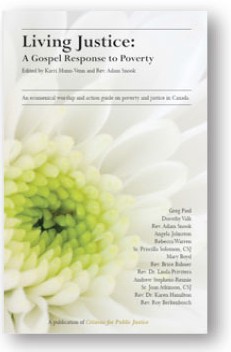 What I’m reading
What I’m reading
Living Justice: a Gospel Response to Poverty
Edited by Karri Munn-Venn and Rev. Adam Snook
Several of us at The Journey Ottawa (C2C Network church plant), have recently been talking and praying about what it would look like for our families to move into and be a prayerful, loving presence in one of our city’s “socio-economically disadvantaged” neighbourhoods. We have felt God calling us to do this as a way to practically seek the peace and renewal of our city, stretch our notions of comfort and security, and wrap our lives up with the sort of people who were so central to Jesus’ ministry.
Anabaptists have long been known for this sort of emphasis on following and living out Jesus’ example in concrete, tangible ways. While buzz-concepts like “missional” and “incarnational” are helping the church refocus itself in this regard, they’re really nothing new: if Christians want to know what we should be about, we simply need to look to Jesus.
As those of us at The Journey and beyond have immersed ourselves in the Gospel narratives, we cannot escape the fact that Jesus cared deeply about the poor, marginalized, and vulnerable. He lived, ate with, and associated with those on the bottom of the socio-economic ladder. He met the practical needs of those who were suffering. And he challenged the unjust social structures that created those conditions.
Compassion and justice for the poor, in fact, permeate the entire biblical narrative. The Bible contains more than 2,000 verses on poverty – more than almost any other single issue. As U.S. evangelist Tony Campolo said in an interview on CBC TV, “If you ignore what the Bible is really about – helping poor and oppressed people – you’ve missed the message of Jesus.”
Yet, while most of us would intellectually assent to the notion that followers of Jesus are called to be people of compassion and justice, figuring out how to live it out can be a challenge. For some of us, it can be difficult to know where to start. For others, it’s hard to find the motivation to keep going.
A new Canadian resource, Living Justice: A Gospel Response to Poverty, attempts to help Christians make the jump from reflection to action. Published by Citizens for Public Justice, the book contains short meditations, Scripture passages, prayers, discussion questions, and activities that examine the reality of poverty in Canada (in its various dimensions), and push and prod readers to apply the biblical mandate to “do justice” at the individual, community, and structural levels. Living Justice’s contributors span the Canadian denominational spectrum, and include the likes of Greg Paul (author and pastor at Toronto’s Sanctuary Ministries), and Mennonite pastor and theologian Brice Balmer.
Living Justice can be used as-is for Bible studies, adult education classes, or youth groups. It could also easily adapted by individuals for sermons, reflections, or personal devotionals.
If our lives and churches are to be a reflection of our calling as followers of Jesus, Living Justice is a resource to help us translate talk into action.
